Supreme Court of the United States facts for kids
Quick facts for kids Supreme Court of the United States |
|
|---|---|
 |
|
| Established | 1789 |
| Country | United States |
| Location | Washington, D.C. |
| Coordinates | 38°53′26.55″N 77°00′15.64″W / 38.8907083°N 77.0043444°W |
| Composition method | Presidential nomination with Senate confirmation |
| Authorized by | U.S. Constitution |
| Judge term length | Life tenure |
| Number of positions | 9, by statute |
| Website | Supreme Court of the United States |
| Chief Justice of the United States | |
| Currently | John Roberts |
| Since | September 29, 2005 |
The Supreme Court of the United States is the highest court in the United States of America. This means it's the most important court in the country. It leads the Judicial Branch, which is the part of the U.S. government that interprets laws. It's the only U.S. court created directly by the United States Constitution. All other courts in the United States must follow its decisions.
The Supreme Court chooses which cases it will hear. Many people ask the Supreme Court to decide their cases, but the Court says no to most of them. For the Supreme Court to hear a case, it must be about federal law or involve laws from more than one state. Cases usually start in a lower federal court or a state supreme court first. Even then, the Supreme Court can still choose not to hear a case for any reason. There are a few rare cases that can start directly at the Supreme Court, and these cases must be decided by them.
The judges, called justices, serve for their entire lives. They can choose to retire earlier or be removed from their job if they do something wrong (this is called impeachment). If a justice retires, they might still be asked to work as a judge in a federal appeals court. New justices are chosen by the President of the United States. Then, the United States Senate must approve them.
Contents
History of the Supreme Court
The first U.S. Congress created the detailed plan for the federal court system in 1789. This plan was called the Judiciary Act of 1789. The Supreme Court was set up as the highest court in the country. It was meant to be in the nation's capital. At first, it had one chief justice and five other justices.
President George Washington quickly chose the first people to serve on the Court. John Jay became the first Chief Justice. Five others were chosen as associate justices. All six were approved by the Senate on September 26, 1789.
The Supreme Court held its very first meeting from February 2 to February 10, 1790. This happened at the Royal Exchange in New York City, which was the U.S. capital at the time. The first few meetings were mostly about getting organized. The Court didn't hear its first actual cases until 1791.
Where the Supreme Court Meets
The Supreme Court first met in New York City in 1790. When Philadelphia became the capital, the Court met there from 1791 to 1800. After the government moved to Washington, D.C., the Court used different rooms in the Capitol building.
In 1935, the Supreme Court finally moved into its own special building. This building was designed by Cass Gilbert. It looks like other important buildings nearby, like the Capitol and the Library of Congress. It's made of marble and has four floors. Inside, there's the main courtroom, offices for the justices, a huge law library, and other meeting areas. The building even has a gym! The Supreme Court building has its own police force, separate from the Capitol Police.
The building is located across the street from the U.S. Capitol. It's open to the public on weekdays from 9 AM to 4:30 PM. It's closed on weekends and holidays. Visitors can't tour the courtroom by themselves. However, there's a cafeteria, a gift shop, exhibits, and a short film about the Court.
When the Court is not hearing cases, there are talks about the courtroom every hour. You don't need a reservation for these. When the Court is hearing cases, the public can watch. These hearings happen on Mondays, Tuesdays, and Wednesdays from October to April. Visitors are seated first-come, first-served. For very important cases, some people even wait overnight to get a seat!
Current Justices
There are nine justices on the Supreme Court today. One is the Chief Justice, and eight are associate justices. The Chief Justice is John Roberts. The longest-serving justice is Clarence Thomas. The newest justice is Ketanji Brown Jackson, who joined the Court on June 30, 2022.
| Justice / birthdate and place |
Appointed by (party) | SCV | Age at | Start date / length of service |
Succeeded | ||
|---|---|---|---|---|---|---|---|
| Start | Present | ||||||
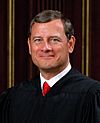 |
(Chief Justice) John Roberts January 27, 1955 Buffalo, New York |
G. W. Bush (R) |
78–22 | 50 | 70 | September 29, 2005 19 years, 328 days |
Rehnquist |
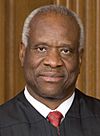 |
Clarence Thomas June 23, 1948 Pin Point, Georgia |
G. H. W. Bush (R) |
52–48 | 43 | 77 | October 23, 1991 33 years, 304 days |
Marshall |
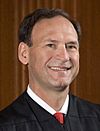 |
Samuel Alito April 1, 1950 Trenton, New Jersey |
G. W. Bush (R) |
58–42 | 55 | 75 | January 31, 2006 19 years, 204 days |
O'Connor |
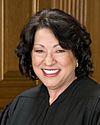 |
Sonia Sotomayor June 25, 1954 New York City, New York |
Obama (D) |
68–31 | 55 | 71 | August 8, 2009 16 years, 15 days |
Souter |
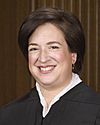 |
Elena Kagan April 28, 1960 New York City, New York |
Obama (D) |
63–37 | 50 | 65 | August 7, 2010 15 years, 16 days |
Stevens |
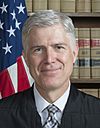 |
Neil Gorsuch August 29, 1967 Denver, Colorado |
Trump (R) |
54–45 | 49 | 57 | April 10, 2017 8 years, 135 days |
Scalia |
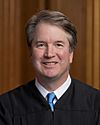 |
Brett Kavanaugh February 12, 1965 Washington, D.C. |
Trump (R) |
50–48 | 53 | 60 | October 6, 2018 6 years, 321 days |
Kennedy |
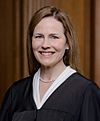 |
Amy Coney Barrett January 28, 1972 New Orleans, Louisiana |
Trump (R) |
52–48 | 48 | 53 | October 27, 2020 4 years, 300 days |
Ginsburg |
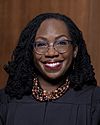 |
Ketanji Brown Jackson September 14, 1970 Washington, D.C. |
Biden (D) |
53–47 | 51 | 54 | June 30, 2022 3 years, 54 days |
Breyer |
This timeline shows how long each current Supreme Court justice has served:

Images for kids
-
The court lacked its own building until 1935; from 1791 to 1801, it met in Philadelphia's City Hall, before moving to the Capitol Building in Washington, D.C.
-
From the 1860s until the 1930s, the court sat in the Old Senate Chamber of the U.S. Capitol.
-
The present U.S. Supreme Court building as viewed from across 1st Street NE
-
Inscription on the wall of the Supreme Court Building from Marbury v. Madison, in which Chief Justice John Marshall outlined the concept of judicial review
See also
 In Spanish: Corte Suprema de los Estados Unidos para niños
In Spanish: Corte Suprema de los Estados Unidos para niños









